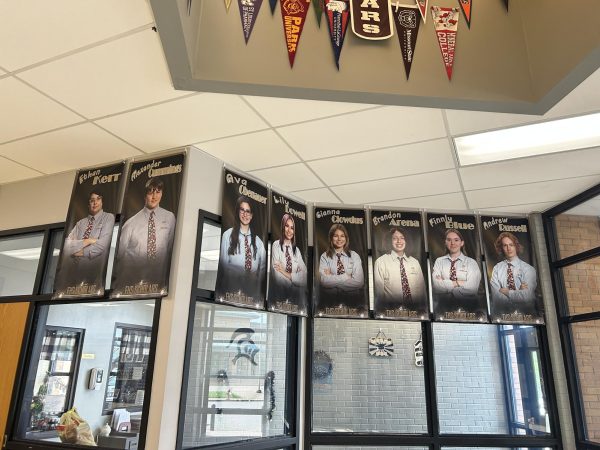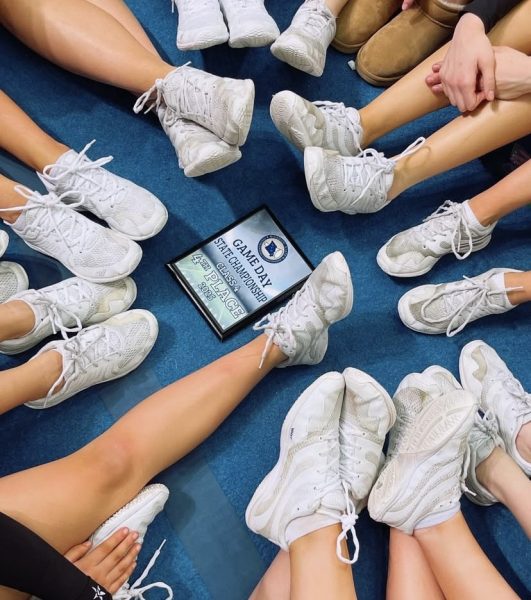Dual Credit: Pros and Cons
Earning dual credit in high school presents both pros and cons–not to mention stress. Find out what’s best for you!
Half of the school year is nearly accomplished, and talk of creating next years’ schedules are already on the rise. Many students are having to take into consideration signing up for dual credit courses and planning out their future as they know it. The question: Is dual credit the right choice for everyone?
To start, dual credit is when a student is able to receive both high school and college credit for a class at the same time. This allows for the student to get a college-atmosphere experience while still being in their high school days. Many argue that dual credit is a superb way to get ahead and insure success, while others say this commitment is too much for a young teen and they need to enjoy their life before it’s gone.
To start with some background knowledge, FHS just this year has switched from the class ranking system to the Latin Honors system, which is not only based on classes but community service and internship hours. You may be wondering: What does that have to do with dual credit? Well, before the class ranking system was done away with, one way students would insure being in the top ten was by taking college classes. Now that FHS does Latin Honors, this isn’t necessarily the case. The only reason a student should be taking a college course while in high school is if they are up for the challenge, not just to ensure they rank among the best in their class. There shouldn’t be any pressure in taking college classes, it’s just a matter of what an individual student wants to do.
There are many pros to partaking in dual credit courses. These include:
–getting familiar to a college atmosphere while in high school
–advanced classes that challenge a student
–exploring academic interests and life beyond college
–helps with workload and time management skills
–good for resumės
–helps the student decide what they may like to major in while in college
–flexibility of online classes
–college credit to possibly graduate early and get ahead (this depends on circumstances and is not guaranteed)
–much cheaper!
There are also quite a few cons to partaking in dual credit courses. These include:
–may interfere with extracurriculars, etc. due to workload
–pressure about grades
–getting a qualifying ACT/SAT score
–staying on top of your college class schedule
–making sure the college you want to go to will accept your credits (In Missouri, if you go to an in-state school and earned college credit in high school, your credits have to transfer).
–can just simply be stressful
–takes away from high school life and may not end up being beneficial to you in the future
If you would like more information on the pros and cons of dual credit, check out this link!
It’s safe to say there is a fine line between a healthy college-level challenge and an overwhelming, unnecessary amount of work. Unfortunately, the latter has been reality for many high school students.
Natia Turner, a senior at FHS who is earning her Associate Degree by the end of this year, gave some great insight into the life of a high schooler taking on college credit. “My experience taking dual credit courses has allowed for me to sort of control my amount of learning. I often got bored in general education classes, and these dual credit courses allowed for me to be challenged. It also has brought me closer to a group of kids. We all are in the same six classes throughout the day, reaching towards the same goal, and it’s nice to have these peers to go and get help with homework or even study for an exam with.”
“If I could go back and change anything about the dual credit courses, it would be to not stress SO much about them. Yes, you need to try your best, but if that 100% doesn’t happen on a test, don’t let it tear you up. You tried your best, and maybe you can get it next time!”
When asked is she’s glad she’s earning her Associate Degree, she said: “Yes, I’m glad I’m earning my Associate Degree, to a certain extent. I think that it really solidifies the hard work I’ve put into my studies, but I don’t think it is necessary for all students who want to succeed to do. I had just assumed that doing so would fast track me into a lot of colleges. I thought it would shave off two years at a university, but most of the time, it doesn’t. To earn that degree, or to just take some challenging college courses, in my opinion, provide the same benefits.”
Finally, Natia said: “If I could give advice to younger students, I would say: get a good group of friends that are all reaching towards the same goals, to help encourage you. Also, start looking at these dual credit courses as a sophomore if you are interested in getting your Associate Degree. This prevents from overwork and feeling like you’re cramming a bunch of homework every night. It helps space out the workload a lot better. Anyone who wants to take these dual credit courses should! You can do anything you put your mind to!”
Kassandra Ramos, another senior at FHS, said this about her experience with college courses: “I’ve had an overall positive experience taking dual credit courses in high school. The course content can be difficult, but it challenges me in a healthy way and keeps me from being bored. Additionally, it gives me the benefit of being exposed to advanced class content of a college course with the help and instruction of a high school teacher.”
She also mentioned: “If I could go back before I started taking dual credit courses, I would have better prepared to taking notes during a lecture-based class.” Kassandra explained how she was in a class where her classmates shared notes to make sure all the content was covered. “…it would have been nice to know how to take better notes on my own as well.”
She continued: “I am very grateful for the opportunity to earn my Associate Degree in high school! Not only will it make me stand out, but it will also allow me to skip general education courses in many state universities. That way, I can get right to taking courses that I relate better to my major and desired career.”
Finally, Kassandra topped off her advice with a word to younger students. She said the hardest part would be time management. “Being a full time college and high school student can be exhausting and a major scheduling dilemma, especially if you participate in extracurriculars as well.” She then said: “Know going into it that you may have to make sacrifices, such as choosing to study instead of spending time with friends. Make sure you surround yourself with people who are willing to support your goals and are understanding of your busy schedule. It will be worth it in the end!”
All in all, taking a college course while in high school is a healthy, challenging, and positive experience. Whether or not you decide to get your Associate Degree, 42 hour block, or just take one class, do what’s best for you! Make these classes difficult but rewarding, and don’t let them consume you! If you have more questions, talk to Dr. Reeves or visit this site: click here!

Interests: Cross Country, Track, Student Council, FBLA, Journalism
Quote: “We are what we repeatedly do. Excellence, then, is not an act, but a...






